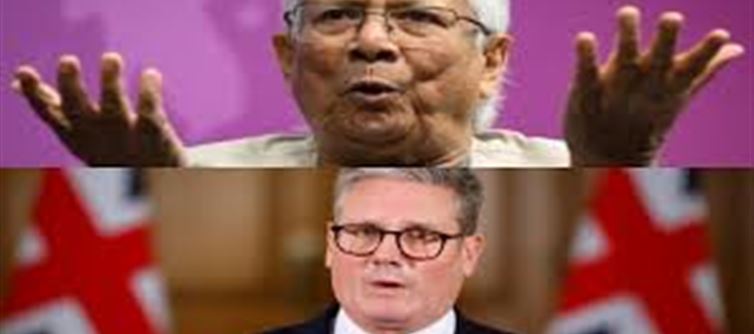
Bangladesh interim government chief adviser Mohammad Yunus has suffered a major diplomatic setback on his UK visit. According to media reports, british prime minister Keir Starmer has flatly refused to meet him. british government officials have confirmed that prime minister Starmer has no plans to meet Yunus. However, he declined to comment further on this.
Yunus is currently on a four-day visit to britain and on wednesday (11 june 2025) he met UK National Security Advisor Jonathan Powell at his hotel. There was a lot of commotion and publicity in the local media of Bangladesh about Yunus's visit to Britain. Many reports claimed that he would meet the british prime minister, but Yunus himself admitted in an interview to a british newspaper that Starmer had not agreed to meet him.
Radicalism and terrorism in Bangladesh
As soon as Yunus arrived in britain, hundreds of demonstrators protested outside London's Heathrow airport and his hotel. The demonstrators carried black flags and banners that read "Yunus is the killer of liberation fighters", "Go back Yunus". The demonstrators accused him of promoting radicalism and terrorism in Bangladesh. They demanded that Hindu priest Chinmay krishna Das be released immediately and Yunus be put in jail.
Shoes and eggs thrown at Yunus' convoy
According to eyewitnesses, the people involved in the protest threw shoes and eggs at Yunus' convoy, mostly Awami League supporters and Bangladeshi citizens who were forced to take refuge in britain after Yunus came to power. A formal letter was also sent by the UK branch of the Awami League to 10 Downing Street, the Speaker of the house of Commons, the King's Foundation and the Commonwealth Secretariat. In this letter, the british government was appealed not to recognize the Yunus administration. The letter said that at a time when bangladesh is going through economic crisis, political repression and human rights violations, especially atrocities against women and girls have increased, any kind of British involvement with Yunus could have a negative impact on the global priority of democracy and rule of law.




 click and follow Indiaherald WhatsApp channel
click and follow Indiaherald WhatsApp channel